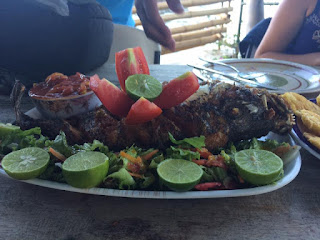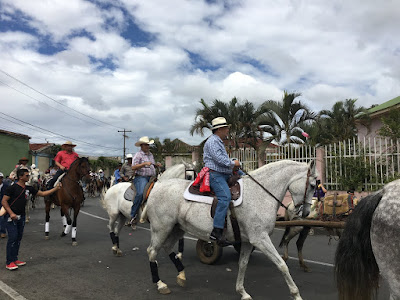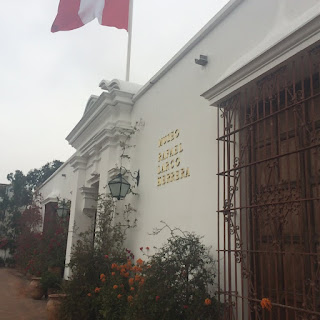Granada
One day, J, a few of her cousins, and I went on a trip to a city called Granada, which is southeast of Managua. Granada is a popular tourist town as it has beautiful Spanish colonial architecture and is located by the water. We took a boat ride off the coast of Granada and rode around the thousands of islands created by a volcanic eruption a long time ago. Many of the islands have houses or hotels on them and two of them had restaurants. We stopped at one to eat some fresh fish and drink Nicaraguan beers. There was even a small pool for the kiddies.
 |
| La Catédral de Granada |
 |
| A view from the boat |
Diriamba and the Festival of San Sebastian
Diriamba is a small town known primarily for its clock tower and its annual Festival of San Sebastian, which I was fortunate enough to attend. It is a relatively poor town and most of the residents seemed to own their own businesses and sell goods at the market or provide services such as auto repair or tech support. J's cousin who hosted us, for example, made Nicaraguan cheese, a delightful smoky, salty cheese, in his back patio and sold it at the market.
 |
| The famous clock tower of Diriamba |
When I first told J that I would be able to join her on her trip to Nicaragua she mentioned the Festival of San Sebastian and said that she was excited because she had never had a chance to see it before. San Sebastian is the patron saint of Diriamba and the next town over also celebrates its patron saint the week before, so the area basically has a two week long party. She mentioned that there would be a horse parade and that we might even get a chance to ride her uncle's horse. She also said there would be dancing and music and, oh yeah, a bull they light on fire that runs through the streets. A bull on fire? That runs through the streets? She didn't provide any additional detail and I assumed that I had misheard her and later forgot all about it.
The festival lasted a number of days. One day was dancing and music, another day was the horse parade, still another was a re-creation of the Spanish colonialists arriving in Nicaragua. For the latter, male residents dress up in white masks and costumes and dance with each other. Both male and female characters are played by men. It was a strange sight to behold. Later, they had a shrine to San Sebastian which they carried through the town.
Later in the week, J and I arrived late at night and saw that a huge crowd had assembled in the town center. People were squished onto the sidewalks though the streets had been closed to cars for the festival. We waited and waited not knowing what was supposed to happen and finally some fireworks went off. J and I couldn't figure out why people were watching the fireworks from just a few areas of the square. The fireworks were up in the air, so shouldn't they be standing all over? We moved from the very crowded sidewalk onto the street where a few men and teenage boys were standing drinking beer. There was a lot more space there and we enjoyed the fireworks in our spacious spots. Then, all of a sudden, we heard screaming and I just caught a glimpse of what appeared to be fire running through the street. Then I heard J yell "the bull!" We quickly ran to the sidewalk and fought our way through the crowds to get away from the bull just as it rammed itself into a bunch of people. I couldn't see it but I heard screaming and could tell that it was running from one side of the street to the other. "Is that a real bull?" I asked incredulously. J laughed. She explained that it's just a man dressed up as a bull with fireworks shooting off of him. We later found out that teenage boys will intentionally confront the bull in order to obtain burns and scars, which they show off to teenage girls. We left soon after the bull arrived.
















































